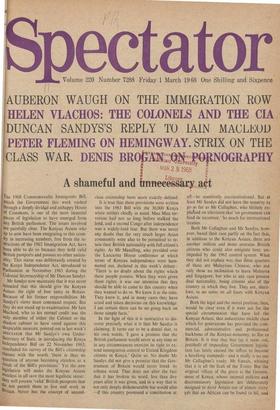It is true that these provisions were written into the
1963 Bill with the 30,000 Kenya white settlers chiefly in mind. Mau Mau ter-, rorism had not so long before stalked the land, and a second Congo after independence was a widely-held fear. But there was never any doubt that the very much larger Asian community were also to be permitted to re- tain their British nationality with full citizen's rights. As Mr Maudling, who presided over the Lancaster House conference at which terms of Kenyan independence were ham- mered out, declared in this week's debate : `There is no doubt about the rights which these people possess. When they were given these rights, it was our intention that they should be able to come to this country when they wanted to do so. We knew it at the time. They knew it, and in many cases they have acted and taken decisions on this knowledge. I am certain there can be no going back on those simple facts.'
In the light of this it is instructive to dis- cover precisely what it is that Mr Sandys is claiming. It turns out to be a denial that, in his own words, 'I gave a promise that the British parliament would never at any time or in any circumstances exercise its right to ex- tend immigration control to United Kingdom citizens in Kenya.' Quite so. No doubt Mr Sandys did not give a promise that the Gov- ernment of Britain would never break its solemn word. That does not alter the fact that it has broken its word, less than five years after it was given, and in a way that is not only deeply dishonourable but would also —if this country possessed a constitution at all—be manifestly unconstitutional. But at least Mr Sandys did not have the temerity to go as far as Mr Callaghan, who blithely ex- plained on television that 'no government can bind its successor.' So much for international treaties.
Both Mr Callaghan and Mr Sandys, how- ever, based their case partly on the fact that, in addition to the Kenyan Asians, there are another million and more overseas British citizens who could also emigrate here, un- impeded by the 1962 control system. What they did not explain was that three quarters of these are Malaysian Chinese, who not only show no inclination to leave Malaysia and Singapore, but who in any case possess dual nationality, being citizens also of the country in which they live. They are, there- fore, in no sense on all fours with Kenyan Asians. hence, in despair, out of Kenya altogether.
When this journal made this point a fort- night ago we were rebuked by the Kenya High Commissioner on the grounds that discrimination in Kenya is based on citizen- ship and not race, and that anyway Britain was just as bad. Neither of these propositions can be sustained for a moment. Kenyan Asians with British passports have, ever since the introduction of the discriminatory legis- lation, been clamouring to acquire Kenya citizenship and have not been permitted to do so. As for the comparison with Britain, which is about to introduce a race relations Bill to prevent discrimination in employment, while Kenya is busy officially creating it (and her ministers openly refer to a policy of `africanisation') perhaps the High Commis- sioner would care to reveal the comparative numbers of coloured people who are fleeing British shores because of racial discrimina- tion.
It is beyond belief that this country con- tinues to provide f12 mullion a year in aid to the Government of Kenya, when we could be using the money in'Stead to resettle and inte- grate into Britain tie Asian refugees which that government hp created. There might even be enough over to pay for the much- needed immigrants' appeal machinery, which Mr Callaghan has found so prohibitively expensive at fi million a year.
The 1968 Commonwealth Immigrants Bill is a shameful and unnecessary piece of panic legislation. On the Home Office's own figures there are now at most only 125,000 Asians with British passports in Kenya. The Bill is unnecessary, because a simple undertaking by the Government that right of free entry would continue would have substantially re- duced the rate of influx; while a temporary moratorium on the entry of Commonwealth immigrants under the 1962 Act—people. to whom Britain has no special obligation— could have ensured that there was no increase whatever in the overall level of immigration into this country. It is shameful because we have encouraged a particular community to build their future under the protection of a British passport, and then effectively taken that passport away just when they most needed it. The present Government has, over the past three years, shown itself to be utterly incompetent in managing this country's affairs. It has now demonstrated that it is contemptible as well.



































